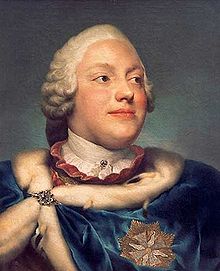Frederick Christian of Saxony
| Frederick Christian | |||||
|---|---|---|---|---|---|
 |
|||||
| Elector of Saxony | |||||
| Reign | 5 October – 17 December 1763 | ||||
| Predecessor | Frederick Augustus II | ||||
| Successor | Frederick Augustus III | ||||
| Born |
5 September 1722 Residenzschloss, Dresden |
||||
| Died | 17 December 1763 (aged 41) Residenzschloss, Dresden |
||||
| Burial | Katholische Hofkirche | ||||
| Spouse | Maria Antonia of Bavaria | ||||
| Issue more... |
Frederick Augustus I, King of Saxony Anthony, King of Saxony Maria Amalia, Duchess of Zweibrücken Prince Maximilian |
||||
|
|||||
| House | House of Wettin | ||||
| Father | Frederick Augustus II, Elector of Saxony | ||||
| Mother | Maria Josepha of Austria | ||||
| Religion | Roman Catholicism | ||||
| Full name | |
|---|---|
| Friedrich Christian Leopold Johann Georg Franz Xaver |
Frederick Christian (German: Friedrich Christian; 5 September 1722 – 17 December 1763) was the Prince-Elector of Saxony for fewer than three months in 1763. He was a member of the House of Wettin. He was the third but eldest surviving son of Frederick Augustus II, Prince-Elector of Saxony and King of Poland, by his wife, Maria Josepha of Austria.
A weak child since his birth, he suffered some paralysis in one foot and was dependent on wheelchairs early in life. In a well-known portrait, which shows his Wettin and Wittelsbach relatives around him, he appears in his wheelchair. Today, this painting is shown in the Schloss Nymphenburg. His mother tried repeatedly to induce him to take monastic vows and renounce his succession rights in favour of his younger brothers.
The early deaths of his two older brothers, Frederick Augustus (1721), who was stillborn, and Joseph Augustus (1728), made him the heir to the throne. When his father died, on 5 October 1763, Frederick Christian succeeded him as Elector.
Even before, Frederick Christian had written in his diary: "Princes exist for their subjects, not subjects for their princes. His subjects' wealth, public credit and a well-standing army make up the true happiness of a prince," thereby openly declaring himself open to the ideas of the Age of Enlightenment. He was also known for his considerable musical talent.
In Munich on 13 June 1747 (by proxy) and again in Dresden on 20 June 1747 (in person), Frederick Christian married his cousin Maria Antonia of Bavaria. Like him, she was exceptionally talented in music and the couple had nine children.
One of his first acts as Elector was the dismissal of the extremely unpopular prime minister, the Count Heinrich von Brühl, who had plunged Saxony into crisis, first with his failed economic policy, but particularly by his catastrophic foreign policy, which caused the Electorate to become involved in the Seven Years' War.
...
Wikipedia
